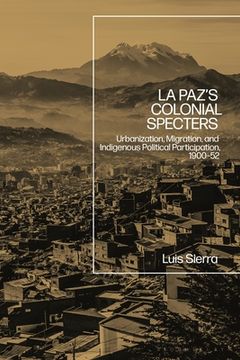Share
La Paz's Colonial Specters: Urbanization, Migration, and Indigenous Political Participation, 1900-52
Luis Sierra
(Author)
·
Bloomsbury Publishing PLC
· Paperback
La Paz's Colonial Specters: Urbanization, Migration, and Indigenous Political Participation, 1900-52 - Sierra, Luis
Choose the list to add your product or create one New List
✓ Product added successfully to the Wishlist.
Go to My Wishlists
Origin: U.S.A.
(Import costs included in the price)
It will be shipped from our warehouse between
Monday, July 01 and
Thursday, July 11.
You will receive it anywhere in United Kingdom between 1 and 3 business days after shipment.
Synopsis "La Paz's Colonial Specters: Urbanization, Migration, and Indigenous Political Participation, 1900-52"
This original study examines a vital but neglected aspect of the 1952 National Revolution in Bolivia; the activism of urban inhabitants. Many of these activists were Aymara-speaking people of indigenous origin who transformed the urban environment, politics and place of "indígenas" and "neighbors" within the city of La Paz. Luis Sierra traces how these urban residents faced racial discrimination and marginalization despite their political support for the Movimiento Nacionalista Revolucionario (MNR). La Paz's Colonial Spectersreassesses the contingent, relational nature of Bolivia's racial categories and the artificial division between urban and rural activists.Building on rich established historiography on the indigenous people of Bolivia, Luis Sierra breaks new ground in showing the role of the neighborhoods in the process of urbanization, and builds upon analysis of the ways in which race, gender and class discourse shaped migrants interactions with other urban residents. Questioning how and why this multiclass and multi-ethnic group continued to be labelled by elites and the state as "un-modern" indigena, the author uses La Paz to demonstrate the ways in which race, class, and gender intertwine in urbanization and in conceptions of the city and nation.Of interest to scholars, researchers and advanced students of Latin American history, urban history, the history of activism and the history of ethnic conflict, this unique study covers the previously neglected first half of the 20th century to shed light on the urban development of La Paz and its racial and political divides.

